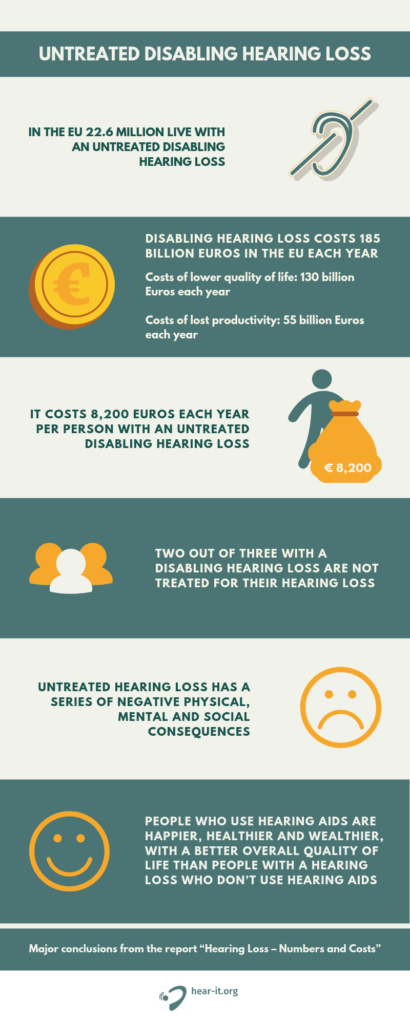Happier, healthier and wealthier with hearing aids
Hearing aid users earn significantly more than non-users. The differential between the two groups increases with the severity of the hearing loss and unemployment rates for non-users are approximately twice those of hearing aid users. There is considerable evidence that people with hearing loss earn, on average, significantly less than people with normal hearing. This is all documented in a new and extensive scientific report “Hearing Loss – Numbers and Costs” by Professor Emerita Bridget Shield, Brunel University in London with the assistance of Professor Mark Atherton, Brunel University, London.
At the same time, hearing aid users report improvements in their overall quality of life and hearing aids have a positive impact on family relationships. Hearing aids and other hearing solutions such as implants also have a positive impact on various aspects of general health: less physical and mental exhaustion, better sleep, less depression and better memory than non-users.
All in all, people who treat their hearing loss are happier, healthier and wealthier, with a better overall quality of life, than hearing impaired people who do not use hearing aids or other hearing solutions.
These are some of the findings of the report “Hearing Loss – Numbers and Costs”, published by hear-it AISBL.
“There are so many benefits of treating a hearing loss that I can only recommended that if you have a hearing loss you should start wearing hearing aids or implants. And if you think you might have a hearing loss my best advice is to have a hearing test,” says secretary general Kim Ruberg, hear-it AISBL.
Earnings and employment
The report documents that there is considerable evidence that people with untreated hearing loss earn, on average, significantly less than people with normal hearing.
People with an untreated hearing loss experience higher unemployment rates than people without hearing loss. The employment rate among people with hearing loss of working age is 83% of the employment rate among the population in general.
Early retirement among people with a disabling hearing loss and less demanding jobs also means that the average income of people with hearing loss is below that of people with normal hearing.
Cost to society
The report also documents that for society as a whole, untreated disabling hearing loss means lost productivity, economic losses due to lower quality of life and an increased burden on social benefits such as unemployment benefits and pensions as well as increased health care costs due to comorbidities such as depression and cognitive decline and more hospitalisations in general.
The report finds that in total untreated, disabling hearing loss in the EU costs 185 billion Euros each year. Untreated, disabling hearing loss is defined as a hearing loss of 35dB on the better ear. Lower quality of life due to disabling hearing loss costs the EU 130 billion Euros each year. Lost productivity in society due to higher unemployment among people with a disabling hearing loss costs 55 billion Euros each year in the EU. In Europe as a whole, disabling hearing loss costs 216 billion Euros each year because of lower quality of life and lost productivity. To this must be added additional increased health care costs because of untreated hearing loss.
Quality of life
The report documents that people with an untreated hearing loss experience lower quality of life. The more severe the untreated hearing loss, the greater the loss in quality of life. Hearing loss has more of an impact on quality of life than many other chronic conditions such as blindness and vision impairments, Alzheimer’s and other dementias. Untreated hearing loss has a series of negative physical, mental and social consequences. Untreated hearing loss can lead to depression, loneliness and social isolation. Untreated hearing loss also has multiple effects on personal and family relationships.
Untreated hearing loss influences general physical health and wellbeing and reduces physical activity. People with hearing loss are more likely to have other chronic diseases than people with normal hearing.
There is a documented relationship between untreated hearing loss and cognitive decline and dementia.
Fatigue, both during and after work, is also a major problem affecting many people with an untreated hearing loss. People with an untreated hearing loss in general also have more sick days.
Treating hearing loss is cost-efficient
Treating hearing loss with hearing aids or other hearing solutions is very cost-efficient. Compared to the costs of an untreated disabling hearing loss, both for the individual and the society, the treatment of hearing loss is very cheap. This also means that it is very cost efficient. The investment in treatment is repaid several times, both for the individual and for society, especially when it comes to earnings and employment (productivity), quality of life and reduced health care costs.
About the report
The report, “Hearing Loss – Numbers and Costs”, was carried out for hear-it AISBL by Professor Emerita Bridget Shield, Brunel University in London with the assistance of Professor Mark Atherton, Brunel University, London. In 2006, Professor Bridget Shield compiled the first report for hear-it AISBL: “Evaluation of the Social and Economic Costs of hearing Impairment”.

